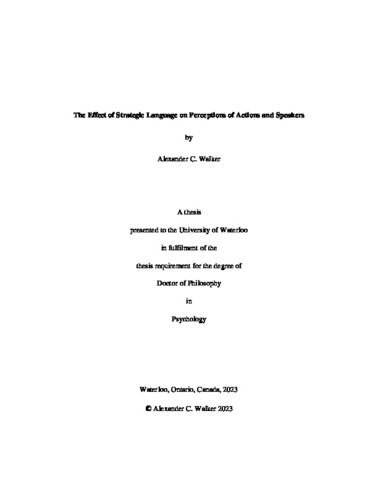| dc.description.abstract | Describing the actions of others (or oneself) necessitates that a speaker make linguistic choices, as multiple terms can often be used to describe the same act. The present work investigates the consequences of these linguistic choices, assessing the extent to which a self-serving speaker can, through the strategic use of euphemistic (agreeable) and dysphemistic (disagreeable) terms, influence peoples’ evaluations of actions while avoiding the reputational consequences typically associated with deception. In this dissertation, I aim to better understand the antecedents and consequences of strategic language across different social and information contexts, discussing the theoretical and applied implications of the results of eight experiments (N = 4,828) within the context of prior work on linguistic manipulation and political polarization.
First, I demonstrate that participants’ evaluations of actions are made more favourable by language that replaces a disagreeable term (e.g., torture) with a semantically related agreeable term (e.g., enhanced interrogation) in an act’s description. Notably, providing participants with more knowledge about the actions they evaluated reduced (but did not eliminate) the persuasive influence of a speaker’s linguistic choices, suggesting that the persuasive potential of strategic language is greater when the details of an event are lacking. Even though the strategic use of euphemisms and dysphemisms affected action evaluations, participants judged both agreeable and disagreeable action descriptions as largely truthful and distinct from lies. Similarly, they viewed speakers attributed these descriptions as considerably more trustworthy and moral than liars. Taken together, the present work suggests that a strategic speaker can, through the careful use of language, shape public perception in a preferred direction while avoiding a majority of the reputational costs associated with less subtle forms of linguistic manipulation (e.g., lying).
Second, I investigate the impact of strategic language in the context of political partisanship. Self-serving language is prevalent in the political realm, as liberals and conservatives are motivated to describe political events in a manner that supports group narratives and favourably presents the actions of co-partisans. Using a subset of liberal-biased (e.g., expand voting rights) and conservative-biased (e.g., reduce election security) terms from the aforementioned experiments, I find that partisans view speakers describing politically contentious events using ideologically-congruent language as more trustworthy, moral, and open-minded than speakers describing these same events in a non-partisan way (e.g., “relax voter ID requirements and expand mail-in voting”). Thus, in politically homogenous social networks, individuals (and organizations) may be incentivized to describe reality using ideologically-biased language. While beneficial to individuals in certain social contexts, the prevalence of partisan language may have negative consequences for society-at-large, exacerbating political polarization and hindering compromise across political divides. Support for this claim was found in the present work: When presented to political out-group members, partisan language produced negative evaluations of opposing partisans, with speakers attributed out-group language being viewed as untrustworthy, immoral, and closed-minded. Additionally, presenting Democrats and Republicans with ideologically-congruent descriptions of political events enhanced partisan disagreement and increased the ideological extremity of participants’ action evaluations. Therefore, partisan language, while praised by co-partisans, exacerbated political polarization, damaging trust and amplifying disagreements between Democrats and Republicans. | en |

